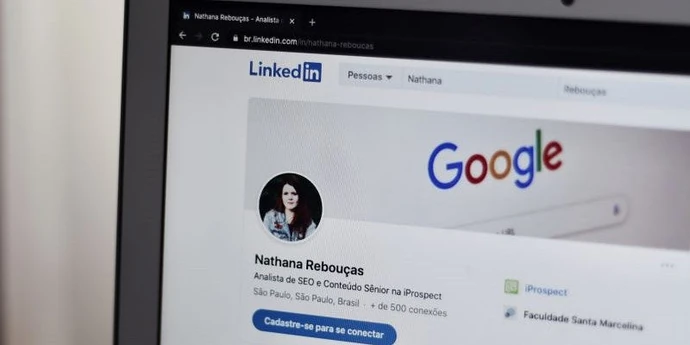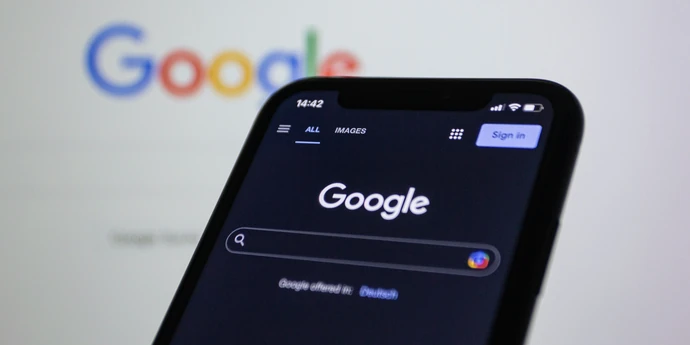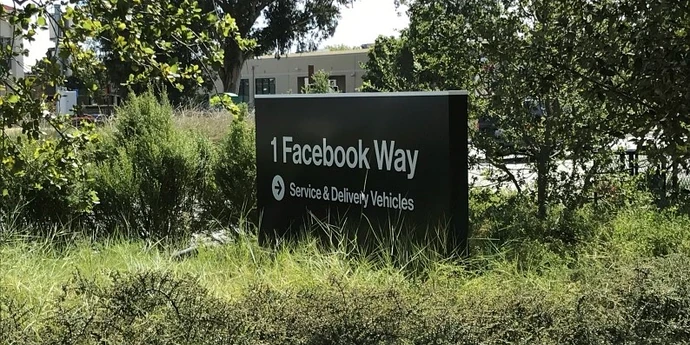In this guide, we're going to cover everything you need to know to prepare for engineering manager interviews at Netflix.
We've gathered insights from ex-Netflix EM interviewers on our platform, successful candidates we've worked with, hundreds of reports from Netflix candidates on Glassdoor, as well as information from Netflix's official engineering blog and culture materials.
Netflix engineering manager interviews aren't easy. Not only will you be navigating a famously rigorous, multi-stage interview process that spans 2 to 5 months, but Netflix is also uniquely focused on culture fit.
You'll need to demonstrate technical depth, strong leadership judgment, and genuine alignment with Netflix's high-trust, high-performance culture. In this prep guide, we cover everything you need to know:
Book 1-on-1 interview coaching with an expert EM coach.
1. Netflix engineering manager role and salary ↑
Before we dive into the Netflix engineering manager interview process, it’s important to understand the role itself. You’ll need to know what it involves, what Netflix looks for, and what you can expect to earn.
1.1 What does a Netflix engineering manager do?
The engineering manager role at Netflix blends technical depth, strategic thinking, and people leadership, much like EM roles at other FAANG companies. But the way these elements come together is shaped by Netflix’s unique cultural philosophy.
You’ll be leading a team responsible for building and maintaining systems that power a global streaming platform with hundreds of millions of members. Depending on your team, that might mean working on content delivery, streaming infrastructure, machine learning for recommendations, developer platforms, or gaming systems.
The scale is massive, and the bar for technical excellence is high. But the real distinction lies in how engineering managers lead.
Here are the core competencies of a Netflix EM, summarized:
Netflix engineering manager key competencies
- Context over control: Netflix runs on a principle it calls "context, not control." You're not expected to manage every decision or step in a project. Instead, your job is to set clear context (the goals, tradeoffs, and constraints) and then trust your team to make the right calls. You hire capable people, provide them with the necessary info, and step back enough for them to take ownership.
- Technical leadership without hands-on coding: You'll need to be technically hands-on enough to understand architecture, guide design choices, and earn the respect of senior engineers. But your success is measured less by how much you personally build, and more by how well your team performs independently.
- Cross-functional collaboration: You'll spend a meaningful amount of time partnering with product managers, designers, and data scientists. This is part of what Netflix calls its Dream Team principle: building teams of high performers who are exceptional at both their craft and collaboration.
- Thriving in autonomy: Netflix's structure gives teams significant independence. This model works well when you thrive on self-direction, but it's not for everyone. The culture is intense and prizes independence, direct feedback, and high accountability.
If that sounds like a fit, the role offers the opportunity to lead a team of talented engineers, work on complex systems at a global scale, and shape technology at one of the world's most creative companies.
1.2 Netflix engineering manager salary
Netflix offers top-of-market compensation, and the engineering manager role is no exception. The total pay for engineering managers at Netflix in the United States typically ranges from about $750K to $1.36M per year, depending on seniority and scope. The median monthly Netflix compensation in the United States package totals $783.2K, according to Levels.fyi.
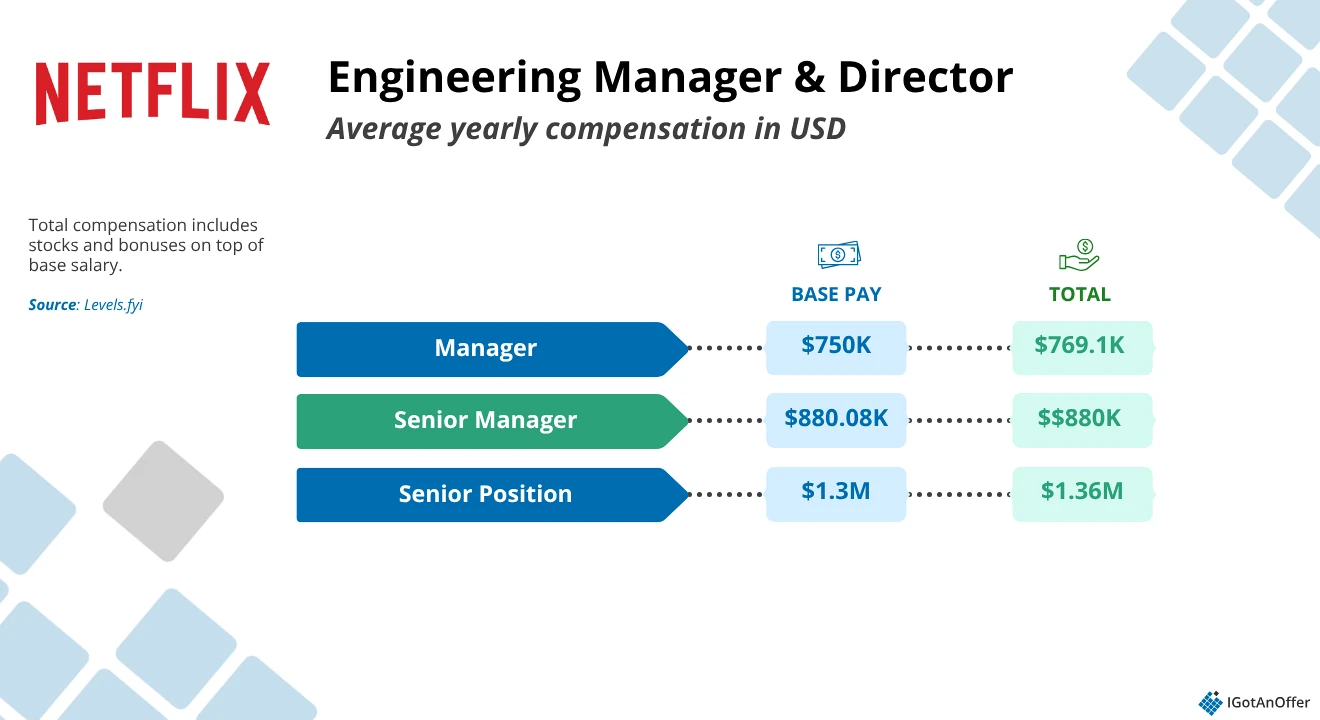
These figures include base salary, annual bonus, and equity, though Netflix's compensation structure differs a little from many other tech companies. Instead of granting stock that vests over several years, Netflix lets employees decide each year how much of their pay they want in cash versus stock options.
You can choose all cash, all options, or any mix that suits you. The options are fully vested from day one, valid for ten years, and remain yours even if you leave the company. This setup gives employees both flexibility and the opportunity to benefit from Netflix’s long-term growth.
Because of that, compensation packages can look higher on paper compared to companies that offer a mix of salary and long-term stock.
Netflix doesn’t reach the upper bounds of Meta’s senior leadership packages. But its median compensation is among the highest among FAANG companies.
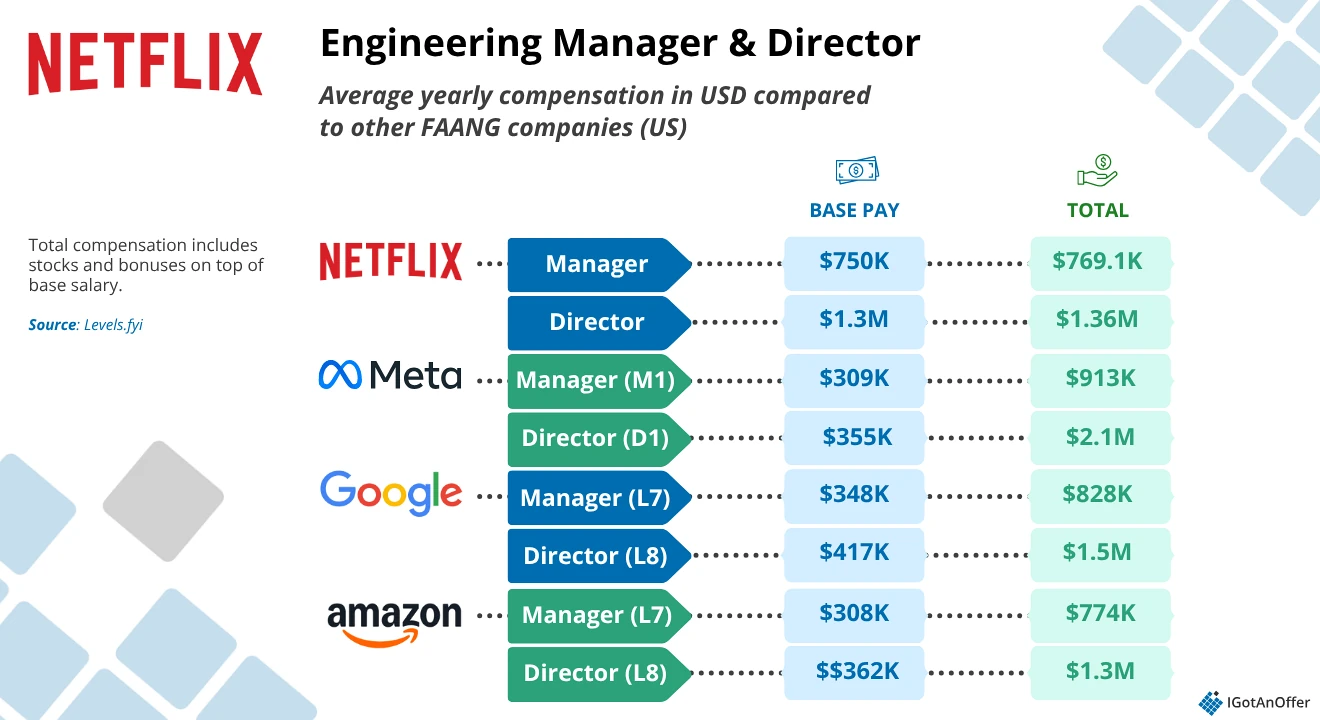
The high compensation reflects Netflix's expectations. The company is explicit about wanting to hire the best people in the industry and paying them accordingly. In return, they expect you to deliver at an exceptionally high level and to work with a degree of independence that can feel uncomfortable if you're used to more structured environments.
It’s also worth noting that Netflix’s compensation philosophy is individualized. Offers are often tailored to the candidate’s experience, impact, and market value, rather than following a rigid level system.
That means you’ll likely negotiate based on your specific background and the role’s scope.
2. Netflix engineering manager interview process & timeline
One of the first things you should know about interviewing at Netflix is that the process is long. From your first recruiter chat to a final offer, the process typically spans 2 to 5 months. That’s longer than most of Netflix’s FAANG peers. Google’s process, for example, is usually one to three months.
But Netflix’s extended timeline is by design. The company runs a multi-stage, highly selective process, so candidates often go through:
Netflix Interview Process
- Initial recruiter screens
- Multiple technical interviews (usually 4+)
- Several rounds with hiring managers
- Cross-functional interviews for culture and collaboration fit
- One or two final onsite loops
Each stage is separated by deliberate pauses (sometimes weeks long) as interviewers debrief, compare notes, and align on whether to move you forward.
Some candidates move faster. We’ve seen reports of two-week timelines, usually when there’s an urgent opening or a standout referral. But the norm is a multi-month journey with several touchpoints and thoughtful deliberation.
Netflix often interviews multiple candidates simultaneously and may wait to compare candidates before making decisions.
Step 1: Recruiter phone screen (30 minutes)
Your first interaction with Netflix will be with someone from the talent team. According to Karen Casella, who was Director of Engineering at Netflix:
"A member of our talent team contacts you to explain the process and to assess high-level qualifications. The recruiter also reviews the relevant open roles to see if you have a strong affinity for one or another."
This isn't an intensive interview. The recruiter will explain Netflix's process, ask about your background, and identify which open roles align with your experience.
Netflix often has multiple engineering manager positions open across different teams, and the work can vary significantly. The recruiter will try to identify teams where your background aligns well with their needs.
If the recruiter thinks there's a potential match, they'll schedule you for a phone screen with one of the hiring managers. At this stage, the recruiter will also explain Netflix's culture and start to give you a sense of what makes the company different.
These conversations are usually open and candid. They’re designed for the interviewer to get to know you, rather than running through a fixed list of questions. Netflix wants candidates to self-select out early if the culture isn’t the right fit, so recruiters are transparent about what the environment is really like.
Step 2: Manager phone screen (30 to 45 minutes)
This is your first conversation with someone who would potentially be your peer or manager at Netflix. According to Netflix's blog:
"The purpose of this discussion is to get a sense for your technical background, your approach to problem solving, and how you work."
Expect questions about your experience leading engineering teams, the technical challenges you've tackled, and your approach to management. The hiring manager is trying to assess whether you have the technical depth for the role and whether your leadership style aligns with how Netflix operates.
Step 3: Technical screen (length varies by team)
Depending on the team, this might take the form of a take-home design exercise, a technical discussion with a senior engineer, or a walkthrough of a past project. You might be asked to discuss the architecture of a system you’ve built, trade-offs you made, and how you navigated uncertainty or scale.
Some candidates have reported being asked to design a service from scratch, such as a system that surfaces metrics to content creators. Other candidates have said their technical screens focused entirely on leadership scenarios, exploring how they guide engineers through design decisions rather than solving them directly.
Netflix’s philosophy is simple: “The problems you are asked to solve are related to the work of the team.” That means you should prepare to talk deeply about systems you’ve built, the decisions behind them, and how you’d approach similar challenges today.
Step 4: Onsite interviews
If you pass the technical screen, you’ll move on to the first onsite round.
Round 1 onsite (4 to 5 interviews, 45 minutes each)
This is where Netflix starts assessing you as both a technical leader and a cultural fit. You’ll meet a mix of engineers, managers, and cross-functional partners, each exploring a different dimension of your experience.
The technical discussions are practical. Expect to be asked how you’d architect a system to support specific business needs, how you’d manage technical debt, or how you’ve scaled systems in the past. Behavioral questions are common too, like how you’ve handled conflict, built alignment across teams, or made tough prioritization decisions.
Netflix has moved away from algorithmic tests toward real-world, scenario-based questions that reflect actual challenges. The focus is on understanding how you think through problems, lead teams, and adapt to changing situations.
Round 2 onsite (2 to 3 interviews, 45 minutes each)
The second onsite round is more focused on cross-functional alignment and leadership. You’ll meet with directors, partner teams, and other engineering leaders who will probe into how you collaborate across boundaries, influence without authority, and maintain alignment in a decentralized environment.
You’ll also spend time talking about culture, decision-making, and growth. Interviewers want to understand how you handle ambiguity, navigate tricky dynamics, and earn trust. According to some candidate reports, this may also involve light role-playing or scenario-based questions to help interviewers get a better idea of how you think.
Plus, Netflix places heavy emphasis on culture, particularly autonomy, accountability, and transparency. They want to know whether you’ll thrive in a system where you’re given full ownership but also full responsibility.
Step 5: Decision and offer
After Round 2, the interview team reviews all the feedback they've collected about you and makes a hiring decision. If Netflix extends an offer, you'll work with the recruiter to discuss the compensation structure.
One aspect of Netflix's offer process that candidates appreciate is the feedback. Even candidates who weren't selected have mentioned receiving more detailed feedback than they typically get from other companies.
A note on centralized hiring
Some Netflix teams use centralized hiring, where you interview once and may be matched with different teams based on fit. If this applies to your process, your recruiter will explain how it works.
As Netflix puts it: “Even though your experience may not be an exact match for one team, you might be more closely aligned with another team. In that case, we would pivot you to another team rather than disqualify you from the process.”
It might feel early to think about this while you’re still preparing for interviews, but it’s worth keeping in mind: compensation at Netflix is negotiable. If you do get an offer, don’t hesitate to ask for more.
For guidance, check out our salary negotiation guides for Amazon, Google, and Meta for negotiation principles you can apply. Even better, you can work with one of our negotiation coaches for more hands-on help and one-on-one advice.
What exactly is Netflix looking for?
Throughout these interview rounds, Netflix is evaluating specific qualities and mindsets. Here's what they're looking for:
Self-motivation and autonomy
Netflix is a company built on freedom and responsibility. Managers are expected to see what needs doing, make good calls, and act without waiting for instructions.
This level of autonomy requires a strong internal compass. You’re trusted to make important decisions on your own, but also held accountable for their outcomes.
Judgment over process
Netflix would rather hire people with strong judgment than create rules to cover every situation. They deliberately keep policies simple so that individuals can exercise discretion.
The company looks for managers who make thoughtful long-term decisions, use data to inform their intuition, and stay steady when there isn’t a clear answer.
Candor and directness
Netflix's culture emphasizes frank communication. Their culture memo describes candor as:
"You willingly receive and give feedback; you are open about what's working and what needs to improve; you admit mistakes openly and share learnings widely."
During your interviews, be genuinely honest. If an interviewer asks about what aspects of Netflix's culture concern you, give a real answer. If they ask about a time you failed, share an actual failure and what you learned from it.
Partnership and collaboration
Despite valuing individual autonomy, Netflix recognizes that complex systems require coordination across teams. Netflix's culture memo emphasizes:
"You seek what's best for Netflix, not yourself or your team."
This is why Round 2 of Netflix's onsite explicitly includes partner engineers or managers from other teams. Interviewers are listening for whether you optimize locally (for your team) or globally (for Netflix).
Technical depth and credibility
Engineering managers at Netflix stay close to the work. You’re expected to make informed technical decisions and earn the trust of senior engineers.
You don’t need to be hands-on every day, but you do need enough depth to ask the right questions, review approaches, and guide architectural direction.
Culture fit
Multiple former Netflix employees have shared contrasting experiences about the culture. One former employee said, "I was utterly miserable and nobody else around me seemed to feel the same." Meanwhile, another long-time employee countered, "I have worked for Netflix for over 5 years, and it's the best place I've ever worked."
These contrasting experiences show why Netflix invests so much time assessing culture fit. They know their environment is distinctive, and people who don't align with it tend to be unhappy despite the high compensation.
3. Netflix engineering manager example interview questions ↑
With Netflix’s values in mind, the next step is to understand how they’re tested. Every question has a purpose, and knowing what’s behind it helps you answer with clarity and confidence.
Below, we’ve compiled a list of real interview questions reported by candidates on Glassdoor, plus a few common ones you’ll see across FAANG-level EM interviews.
To make your preparation more focused, we’ve grouped them into three key categories:
3.1 System design questions
System design questions at Netflix are tied to real problems the company faces or challenges the specific team is working on. This makes sense given Netflix's philosophy of making interviews relevant to actual work.
Based on candidate reports, system design questions for engineering managers can take a few different forms. Some candidates have been asked to design systems in real-time conversations, similar to what you'd experience at other companies. Others have been given more time to prepare a write-up and present their design.
When answering system design questions at Netflix, focus on explaining your reasoning clearly. Interviewers want to see how you think, too. Instead of rushing to sketch an architecture, start by framing the problem, clarifying assumptions, and talking through your priorities.
As you describe your solution, narrate your thought process: why you chose one approach over another, how you’d handle scaling or failure scenarios, and what tradeoffs you’d accept in a production environment. Remember, Netflix values autonomy and sound judgment, so demonstrating how you balance speed, reliability, and simplicity often matters as much as the design itself.
Here are a few sample interview questions reported by real candidates:
Example system design questions asked in Netflix engineering manager interviews:
- Design a service that would show metrics to content creators.
- Design and model core datasets for [specific Netflix use case].
- Walk through a high-level design of a complex system you've built. Explain the tradeoffs you made and why you made them.
Examples from other FAANG companies
- Design a system for displaying adverts next to search results, based on keywords. (Google)
- Design a system that counts the number of clicks on YouTube videos. (Google)
- Design the architecture of the MVP for a restaurant recommendation service. (Meta)
- Build an API to power a crowd-sourced address book. (Meta)
- Design a train booking system. (Google)
For a deeper breakdown of how to approach these kinds of problems, including frameworks, examples, and best practices, check out our system design interview guide.
3.2 Behavioral and leadership questions
These questions come up repeatedly across multiple rounds. And each time, Netflix interviewers dig deeper to uncover not just what you did, but why you made those choices, what alternatives you considered, what the outcomes were, and what you learned from the experience.
Expect follow-up questions that push you to reflect more deeply on your leadership decisions.
One important pattern to notice is that Netflix asks both retrospective questions ("Tell me about a time when...") and hypothetical questions ("What would you do if..."). Together, they help interviewers understand both who you are (your leadership patterns) and how you think (your judgment and adaptability).
These behavioral questions can seem open-ended, but they’re designed to reveal your thought process and leadership style.
Example behavioral and leadership questions asked in Netflix engineering manager interviews:
- How do you resolve conflict?
- Tell me about your main achievements in your current role
- How did you come up with the most innovative idea you've ever implemented? How did you implement it?
- Tell me about the area where you have the most to learn
- What experience do you have building and maintaining a diverse candidate pool for open roles?
Examples from other FAANG companies:
- Why are you an effective leader? (Google)
- Give me an example of when you challenged the status quo. (Google)
- When was the last time you did something innovative? (Uber)
- In your career, what achievement are you most proud of? (Uber)
- What's the hardest conversation you've had to have with one of your directs? (Google)
- How do you handle people who are not team players? (Google)
- How do you set a vision for your team? (Google)
- How do you manage your team’s career growth? (Uber)
- Tell me about a time you had a conflict with your supervisor and how you resolved it. (Uber)
- Describe the worst manager you've ever had. (Uber)
- Tell me about what you've been working on over the last year. (Uber)
- As a manager, how do you handle trade-offs? (Uber)
- Describe how you deal with change in management. (Uber)
- Describe a project in the past that was behind schedule and provide concrete steps that you took to remedy the situation. (Google)
To see how to approach behavioral questions with structure and confidence, explore our behavioral interview guide for software engineers.
3.3 Culture fit questions
Netflix's culture questions try to understand whether you'll thrive in their environment. This matters because Netflix’s culture is unusually high-trust, high-performance, and radically transparent. People who don’t align with that often find it challenging to succeed (and stay happy) there.
Interviewers often reference specific slides or values from Netflix's culture memo, and they’ll expect thoughtful answers, not memorized talking points.
Netflix’s culture memo centers on four core principles:
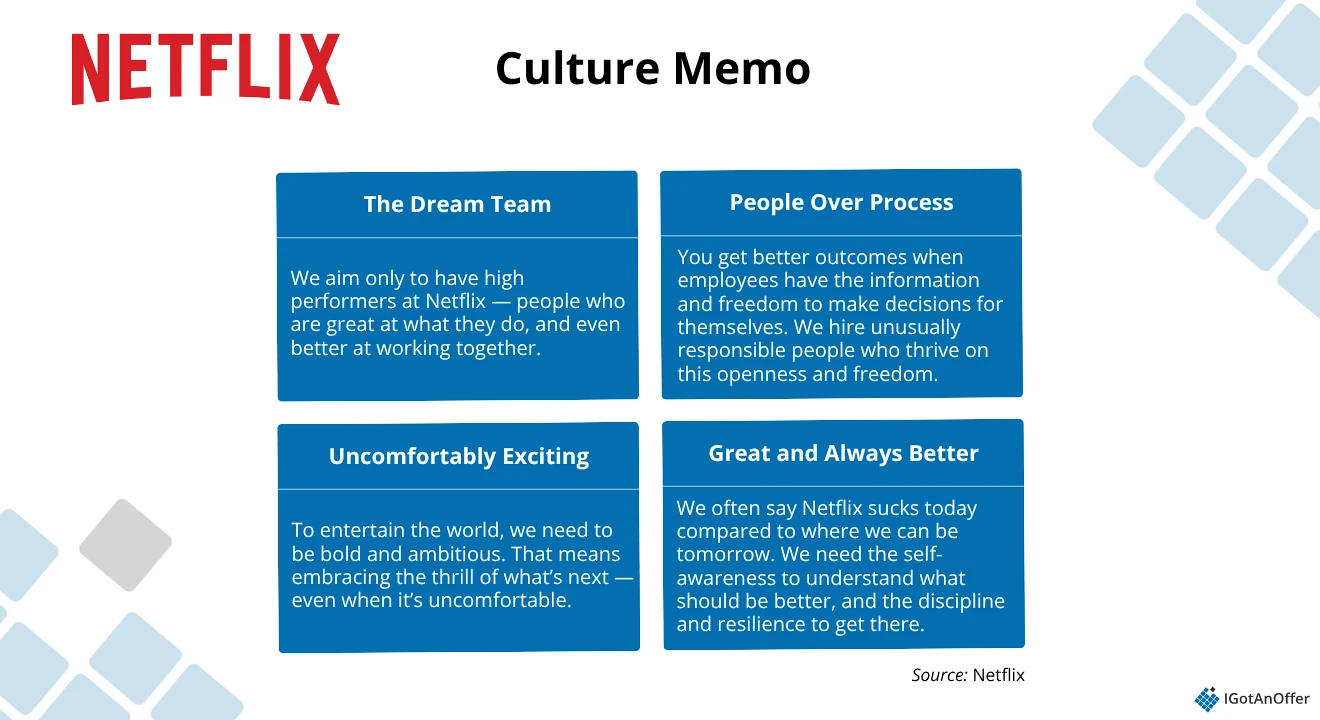
Within those principles are key values that guide how they build teams and make decisions. During interviews, you should be ready to speak to how these values resonate with you and how you’ve lived them in your own work.
Here are the primary values you should expect to discuss:
- Selflessness: Netflix expects people to put what’s best for the company ahead of their own team. Be ready to show examples of times you prioritized shared success over personal credit.
- Judgment: They value making wise decisions even when things are ambiguous. You’ll be judged on how you think through trade-offs, use data, and balance long-term outcomes.
- Candor: A culture of feedback and honest communication is important. Be prepared to talk about how you receive and give feedback, admit mistakes, and learn from them.
- Creativity: Netflix wants leaders who bring new ideas. Expect questions around how you’ve pushed boundaries, experimented, or innovated in your work.
- Courage: They look for people willing to challenge assumptions, take smart risks, and hold fast to principles, even when it’s uncomfortable.
- Inclusion: Netflix recognizes biases and works to build environments where everyone can do their best work. Be ready to talk about how you’ve supported diversity and navigated differences.
- Curiosity: Continuous learning matters a lot. You should be able to point to how you’ve kept yourself growing, taken on new fields, or embraced feedback.
- Resilience: The business moves fast, problems change, and things break. Netflix seeks leaders who can adapt, recover, and keep moving forward under pressure.
Because these values are non-negotiable in how Netflix operates, interviewers will put them to the test. For example, they may ask you, “Which part of the culture memo resonates least with you?”
They'll ask for specific stories showing how you exercised judgment, gave difficult feedback, or innovated under uncertainty. They’ll test how you handle tension between values (e.g., creativity vs. reliability, candor vs. diplomacy).
If you can internalize these values and talk convincingly about how you have embodied them, you’ll significantly strengthen your candidacy.
Netflix puts a strong emphasis on culture fit, so your responses to these questions can make a real difference.
Example culture questions asked in Netflix engineering manager interviews:
- Why Netflix?
- What do you think about the Netflix culture memo?
- What do you like most about the Netflix culture memo?
- What do you like best about the Netflix culture memo, and what resonates less with you?
- Tell me something I can't find on your resume, LinkedIn, or anywhere online.
4. Interview tips ↑
4.1 Learn a technique for answering questions
When answering your Netflix EM interview questions, you should focus on your most relevant achievements and experiences and communicate them in a clear way. An effective way to achieve this is to use a step-by-step method to tell your stories.
The STAR method (Situation, Task, Action, Result) is a popular approach for answering behavioral questions because it’s easy to remember. You may have already heard of it.
However, we’ve found that candidates often find it difficult to distinguish the difference between steps two and three, or task and action. Some also forget to include lessons learned in the results step, which is especially crucial when discussing past failures.
So, we’ve developed the IGotAnOffer method (SPSIL: Situation-Problem-Solution-Impact-Lessons) to correct some of the pitfalls we’ve observed when using the STAR method.
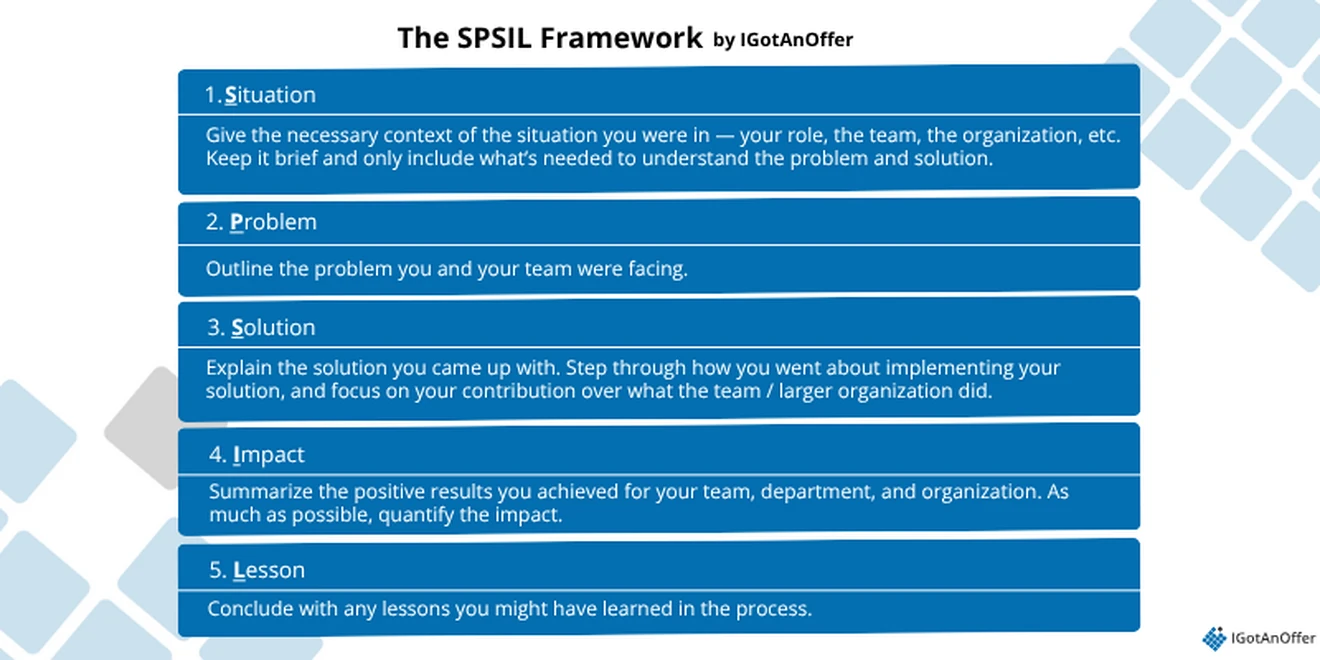
The IGotAnOffer SPSIL Method
- Situation: Start by giving the necessary context of the situation you were in. Describe your role, the team, the organization, the market, etc. You should only give the minimum context needed to understand the problem and the solution in your story. Nothing more.
- Problem: Outline the problem you and your team were facing.
- Solution: Explain the solution you came up with to solve the problem. Step through how you went about implementing your solution, and focus on your contribution over what the team / larger organization did.
- Impact: Summarize the positive results you achieved for your team, department, and organization. As much as possible, quantify the impact.
- Lessons: Conclude with any lessons you might have learned in the process.
The 'Lessons' component is particularly important because Netflix values growth and self-awareness. Interviewers want to see that you extract learning from experiences and apply it forward. Many candidates skip this step, leaving interviewers to wonder if you actually learned anything from the situation.
Strong SPSIL answers are specific, show your thought process, and demonstrate growth. Weak answers are vague ('the team decided'), don't show alternatives considered, or treat failures as one-time events rather than learning opportunities.
Here’s what it looks like in a real interview situation. In this video, Coach Damien (ex-Meta PM) uses the framework in his answers 2-5. You’ll also find sample responses to the most commonly asked behavioral questions: “Tell me about a time you solved a team conflict,” “Tell me about a time you failed,” and “Tell me about a product you led from idea to launch.”
4.2 Keep your stories concise
When answering behavioral questions, clarity matters more than detail. Whether you’re using the SPSIL or STAR method, aim to set up the situation in 30 seconds or less.
Use a timer to stay concise and avoid overexplaining (one of the most common mistakes candidates make). The thing is, in Netflix’s multi-round process, interviewers hear dozens of stories, so keep yours focused and easy to follow.
4.3 Practice system design with Netflix's context
Answering system design questions is a skill in itself. You should start with a high-level design and then drill down on the system component of the design. Use our guide to system design questions and system design interview tips to prepare.
4.4 Adapt to follow-up questions
Don’t be alarmed if your interviewer asks follow-up questions; this is perfectly normal. Listen carefully to the way your interviewer is asking these questions, as there will often be a subtle clue about the specific skills they’re looking to assess from the next part of your answer.
For example:
- "How did your team react to that?" → They're testing collaboration and influence.
- "What other options did you consider?" → They're testing judgment and the decision-making process.
- "What would you do differently now?" → They're testing self-awareness and growth.
- "How did you measure success?" → They're testing impact orientation and data-driven thinking.
If an interviewer asks 'Tell me more about [specific detail]', they're often testing whether you actually did the work or if you're speaking generally about team efforts.
4.5 Brute force, then iterate
When coding, don’t necessarily go for the perfect solution straight away. Google recommends that you first try and find a solution that works as quickly as you can, then iterate to refine your answer.
5. Preparation plan ↑
Like management, interviewing is a skill. The more deliberately you practice it, the better you’ll perform when it matters.
Here are some key tips to make sure you approach your interviews in the right way.
5.1 Study Netflix's culture deeply
If you haven’t already, spend real time reading Netflix’s culture page.
Try to reflect on the harder parts. Maybe you’ve struggled with candor when giving difficult feedback, or courage when challenging a senior leader’s decision. Netflix interviewers can tell when candidates have done real introspection. Plus, authenticity matters more than rehearsed perfection.
5.2 Prepare questions for your interviewers
Netflix expects candidates to be curious and engaged. Thoughtful questions show you're seriously evaluating whether Netflix is right for you (which aligns with their value of mutual selection).
Avoid generic questions. Interviewers can tell when you're asking boilerplate questions versus when you're genuinely curious about the specific team and role.
5.3 Practice by yourself
As discussed above, you'll have to answer three types of questions at Netflix: behavioral, system design, and cultural. The first step of your preparation should be to brush up on these different types of questions and to practice answering them by yourself.
For general interview guidance, check out our Netflix interview process and timeline guide.
For leadership or people management questions, we recommend learning our step-by-step method for answering behavioral questions. In addition, you'll want to write down your answers to the common leadership questions we listed in the previous section.
For another insightful deep dive, you should then read our guide to Grokking the engineering management leadership interview.
For system design questions, we recommend studying our system design interview prep guide and learning how to answer system design questions. These guides cover a step-by-step method for answering system design questions, and they provide example questions with solutions.
For coding interviews, we recommend checking out our coding interview guide.
Interviewing for an EM role at another company? You may also want to check out our other company-specific EM interview guides:
- Google engineering manager interview guide
- Amazon software development manager interview guide
- Microsoft engineering manager interview guide
- Apple engineering manager interview guide
- Meta engineering manager interview guide
- DoorDash engineering manager interview guide
- Uber engineering manager interview guide
Finally, a great way to improve your communication for behavioral, system design, and culture questions is to interview yourself out loud. This may sound strange, but it can significantly improve the way you communicate your answers during an interview. Play the role of both the candidate and the interviewer, asking questions and answering them out loud.
However, by yourself, you can’t simulate thinking on your feet or the pressure of performing in front of a stranger. Plus, there are no unexpected follow-up questions and no feedback.
That’s why many candidates try to practice with friends or peers.
5.4 Practice with peers
If you have friends or peers who can do mock interviews with you, that's an option worth trying. It’s free, but be warned, you may come up against the following problems:
- It’s hard to know if the feedback you get is accurate
- They’re unlikely to have insider knowledge of interviews at your target company
- On peer platforms, people often waste your time by not showing up
For those reasons, many candidates skip peer mock interviews and go straight to mock interviews with an expert.
5.5 Practice with experienced engineering manager interviewers
For more tailored prep, consider working with someone who’s been on the other side of the table, specifically a former Netflix interviewer. A coach can recreate the real interview conditions, offer precise feedback, and help you understand what Netflix actually looks for.
This kind of coaching also helps you build confidence, uncover Netflix-specific insights, and learn how to tell stronger stories. And given that the median compensation at Netflix is around $700,000 for engineering managers, investing in expert guidance can pay off meaningfully.
Our coaching team, for example, includes former Netflix interviewers who've personally conducted these interviews and can provide insider guidance on your Netflix interview and its unique culture assessment.










